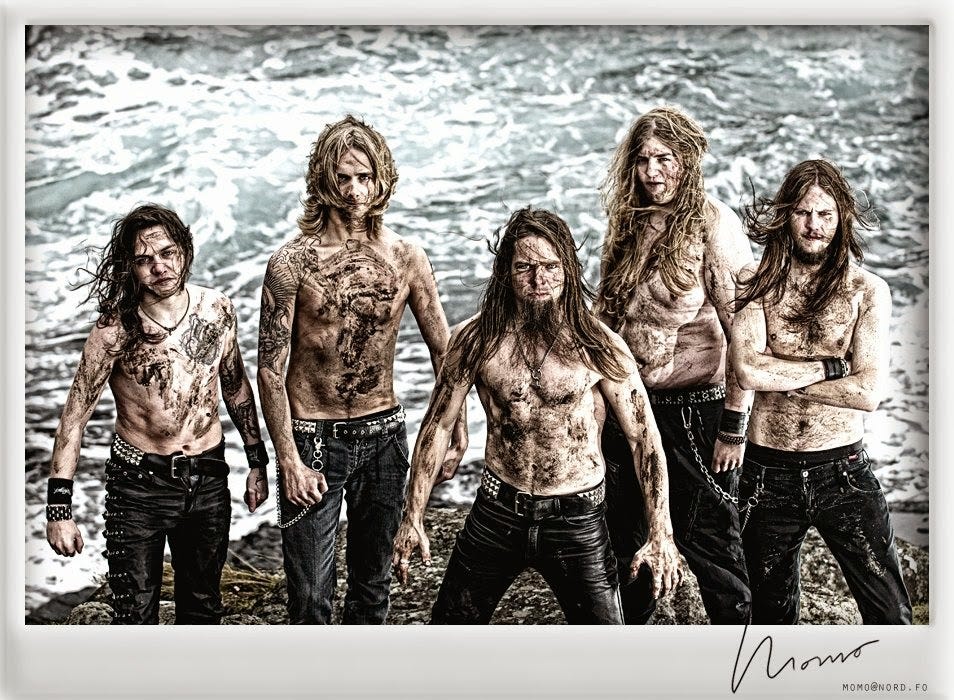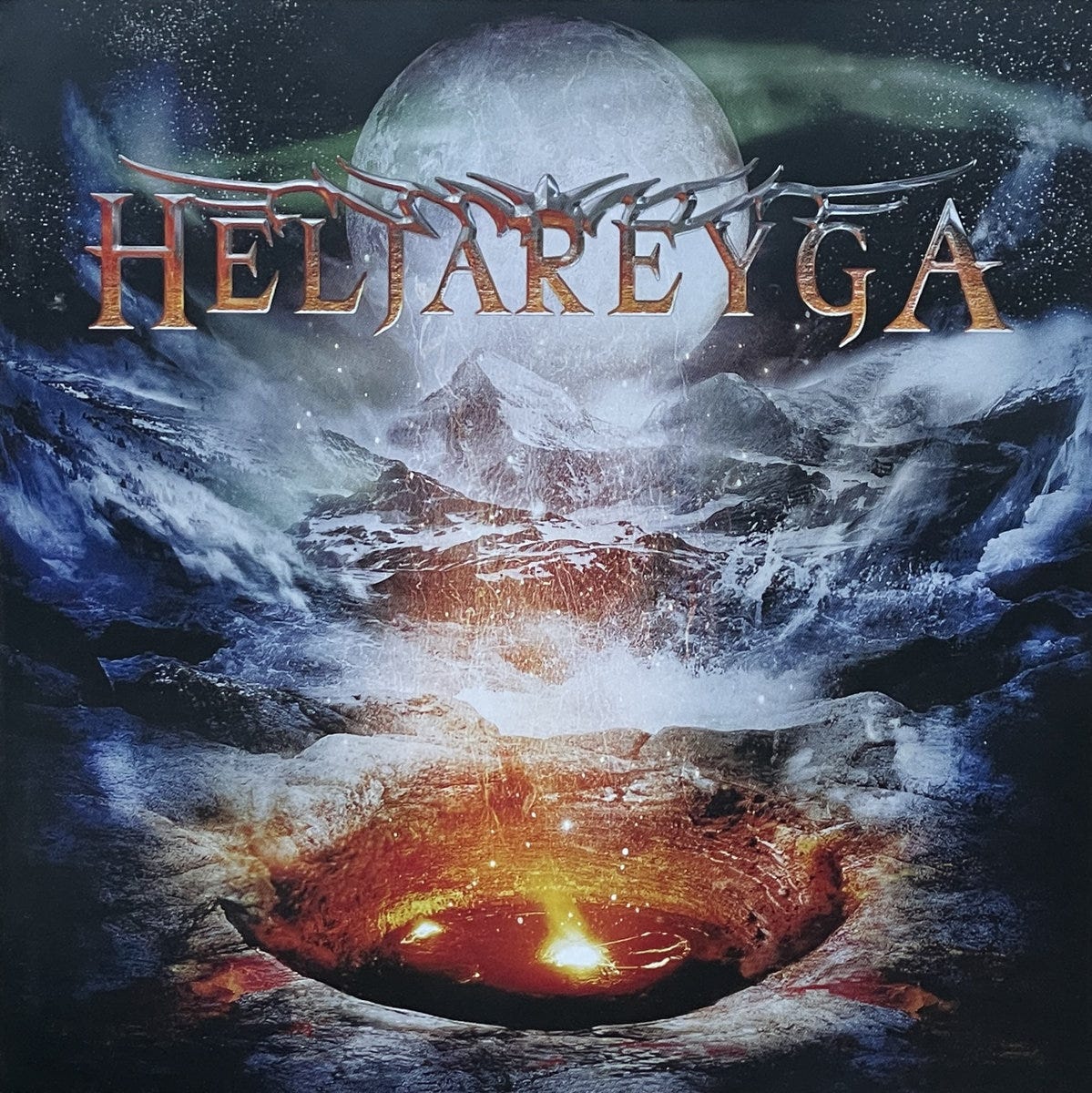Streamlining songs with Heri Joensen
And the dangers of European pride
J: What motivated you to start Heljareyga?
Heri: The songwriting style for Tyr has become simpler and simpler over the years. After we Ragnarok in 2006, we decided to go for a much simpler approach, and it has changed slowly since then, with every album using a simpler recipe. I still like progressive music very much, and I write progressive music all the time, but when we make the Tyr albums, I often take out the parts that I find too progressive for the way we want to go. So Heljareyga is the place to get the progressive musical out. It's as epic as possible, as progressive as I like it, and without taking into consideration that anyone has to listen to it.
J: What are your main influences within the progressive genre?
Heri: One of the main influences for the Heljareyga album was Wintersun. I think the album they made is one of the best progressive metal albums ever. Apart from that, there are many, many different influences, not all of them in metal musics. For example, Andrew Lloyd Webber, the musical Chess, and pop music from the 80s in Scandinavia. I'm not into those styles, but I don't care so much about style; what I like is high quality songwriting. That is what really inspires me.
J: Why should fans of Tyr buy this album?
Heri: Well, if there are some people who like the Ragnarok album, for example, and think that Tyr is not progressive enough anymore, and they prefer the harder approach, with not so accessible music, they'll find that with Heljareyga. It's very progressive; not extremely, but at the level that Ragnarok was. All the lyrics are in Faroese... so that's not very inaccessible [laughs]. But it's not made to be unaccessible. It's made to be something that I like to do. I didn't go for an unaccessible sound.
J: Do you think that the fact that the lyrics are in Faroese can be an obstacle?
Heri: No, I long ago realized, that at least in this genre, languages is not a problem. In Tyr, for example, lyrics in Faroese don't make people like the songs less. We have Faroese, Danish, Norwegian, and Icelandic lyrics, and it appears to make absolutely no difference; we make 80 or 85% of the lyrics in English, and I can't see any difference in how popular those songs are compared to the ones in other language.
J: The Heljareyga album was first released digitally, with physical releases coming after that. Was this a label decision?
Heri: That was from the label. I haven't talked to the label about this, but I think it's a strategy. I think they're trying to to make people buy digitally more by first releasing digitally, and the physical albums later.
J: You have a new Tyr album coming up; The Lay of Thrym. What can you tell us about it?
Heri: I think it's probably less progressive.... well, maybe that's the wrong way to say it. It's more straightforward than the last album [By the Light of the Northern Star]. I think we made the songwriting really streamlined; it's probably the most streamlined sonwriting in an album for us so far. It has a very even flow, in a way, with a big emphasis on strong choruses, and very little emphasis on guitar riffing. It's very melodic, and very much based on more basic songwriting. If you think about, for example, the Ragnarok album, I can imagine some people thinking "okay, when's this guitar masturbation going to be over, so that we can get back to the real song?". I mean, there's not, none of that. It's very basic, and I put as little in there as possible of progressive and flashy guitar stuff.
Apart from that, I think you'll hear it's Tyr as soon as you put it on.
J: Is there are a central theme in this album?
Heri: There is a central theme, but it's not that apparent in all the songs. "The Lay of Thrym" is the story of Thrym, the giant who stole the hammer of Thor, so Thor goes to great lengths to get it back, and ends up killing Thrym and destroying his household, so to speak. But that's not the main story. It's compared to the uprising in the Arab world today against tyrants; I mean, it applies to anywhere in the world, but it's mostly happening in the Arab world today. So the underlying theme is anti-tyranny, anti-theocracy, and anti-dictatorship.
J: What do you think explains the increasing popularity of folk and pagan metal?
Heri: I think Europeans generally feel that we bring back some pre-Christian traditions that have have vanished in Europe, but which have been preserved on the outskirts. If that's true or not, that's a very different question, but that's how people think about Tyr and other pagan bands.
I think that there's a search for European roots and pre-Christian culture, and that and makes this kind of music popular. It could be because of the level of immigration in Europe, with Europeans feeling that their culture is under threat of being wiped out.
J: By expressing pride in their roots and history, other pagan metal bands have been labeled as racists or Nazis. What do you think explains this phenomenon?
Heri: I think this is a huge problem that you get as a European; that you get called a racist by mentioning any pride in your culture or ethnicity. Imagine if people in Africa did that. No one is going to call them racist for they're proud of being Hutu or Maasai or anything like that; and they have the right to do that. It's only because of Sins of the Father, the Second World War, and Nazi Germany, that Europeans feel like they have to go around calling each other Nazis.
This comes especially from political left wing, where anything they don't like they label Nazi or far right, even if what you said is that you're proud of your European ethnicity. You didn't say anything else. You didn't say anything about any other ethnicity. Just like any person from anywhere else in the world could say they're proud of their own ethnicity. It's only when you're a European that it gets assumed that you're against other ethnicities by definition. I think that's a huge problem.
J: Any final message for your fans?
Heri: We hope to see as many people as possible on our gigs, and I really hope that people will buy the new album... so that we can afford to eat and live on Earth.



